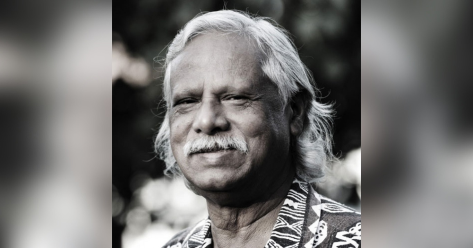 Dr. Zafrullah Chowdhury (27 December 1941 - 11 April 2023) was a Bangladeshi Doctor, Public Health Activist and Politician. He is the founder of Gonoshasthaya Kendra, a rural healthcare organisation. Dr. Chowdhury is known more for his work in formulating the Bangladesh National Drug Policy in 1982. In 1992, he was awarded the Right Livelihood Award for outstanding record of promotion of health and human development.
Dr. Zafrullah Chowdhury (27 December 1941 - 11 April 2023) was a Bangladeshi Doctor, Public Health Activist and Politician. He is the founder of Gonoshasthaya Kendra, a rural healthcare organisation. Dr. Chowdhury is known more for his work in formulating the Bangladesh National Drug Policy in 1982. In 1992, he was awarded the Right Livelihood Award for outstanding record of promotion of health and human development.
A leading civil society figure and political thinker, Chowdhury was a vascular surgeon and public health experts
In 1972 Zafrullah Chowdhury took on the challenge of developing an effective rural health care delivery system based on his experience of running a field hospital with young women and men with no previous medical training and Gonoshasthaya Kendra (GK) was set up. The first concept paper on this ‘Basic Health Care in Rural Area’ presented in Dhaka in April 1972 which was to later become the basis for international discussions on Primary Health Care. The experience of Gonoshasthaya Kendra became the basis of one of the main working papers on which the Alma Ata Declaration of the World Health Organization was framed.
Gonoshasthaya Kendra (GK) is a multi-faceted community and development programme encompassing activities ranging from agricultural cooperatives, community schools, primary health care centres and hospitals, women’s vocational training centres to economic enterprises to help finance GK Trust activities.Gonoshasthaya Pharmaceuticals, Gonoshasthaya Intra-venous Fluid Units, Gonoshasthaya Basic Antibiotics Production Units Gono Mudran (Gonoshasthaya Printing Press) are some of the income generating units owned fully by the Gonoshasthaya Public Charitable Trust (GK Trust).Gonoshasthaya Kendra has for the last 36 years worked on community health services. It has had successfully introduced innovative community health care services in Bangladesh especially in the field of paramedical training and domiciliary services achieving low maternal mortality rates (MMR) and infant mortality rates (IMR). In most GK’s operational areas, MMR and IMR is between 1/3 to ½ of the national average. Family Planning in GK’s field practice area is well accepted and the growth rate is 1.5%, while the national rate is 2.2%. GK had introduced a Rural Health Insurance System in 1973 for providing health care in GK operated Primary Health Care Centres and hospitals. Poor and low income groups are charged lower rates of Health Insurance Premium while rich and middle class pay much higher rates. But all groups receive equal quality health care.Gonoshasthaya Kendra was the first to introduce the concept of paramedics in Bangladesh, an innovation which was later adopted by the Government of Bangladesh in 1977. GK introduced mini-laparotomy method of female sterilisation (tubectomy) in Bangladesh in 1974.
Dr. Chowdury gained prominence by being the driving force in formulating the Bangladesh National Drug Policy in 1982. Before that, 4,000 commercial drugs were available in the market, mostly manufactured by the multi-national companies or imported from abroad. Most of the drugs were out of reach for majority of the people. Some of these drugs were unnecessary and even dangerous whereas the most essential 150 remained in short supply.
National drug policy changed all that. Following WHO guidelines for the developing countries, the policy restricted manufacturing and import of number of drugs to 225. It emphasised on manufacturing of generic drugs and manufacturing them locally. The result has been the wider availability of drugs at drastically reduced prices. And today, Bangladesh has turned into a drug exporting country.
In addition, Gonoshasthaya Kendra has a research programme under which medicinal plants and vaccine research units have been set up. Latest project is the Gono Bishwabidyalay (Peoples University) which has been set up under Private Universities Act 1992 to offer courses in Development and Social Sciences, Local Governance and Health Sciences.
Posted on :
Apr 17, 2023